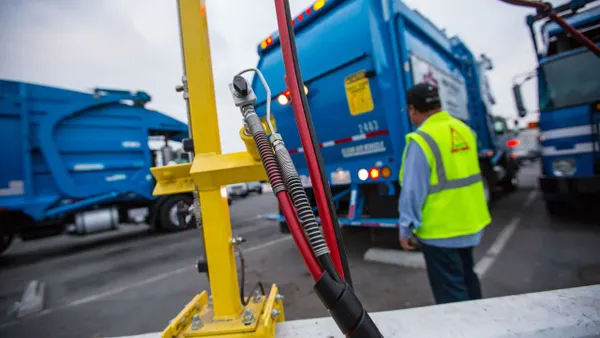Dive Brief:
- Frederick County, MD is drafting legislation that would allow for limited composting of food waste generated off-site at agricultural and commercial properties without going through a lengthy zoning process, as reported by The Frederick News-Post.
- The legislation would permit agricultural properties in the county — after site review and approval — to dedicate up to 5 acres for composting and commercial properties to use up 10 acres for compost. Further approval from the County Planning Commission would be required for commercial properties to sell compost or operate on more than five acres.
- As currently proposed, the legislation would require composting sites to be 25 feet from flood plains, 50 feet from stream banks, and at least 150 feet from property lines, while taking measures to prevent odor and unreasonable noise from passing the property line.
Dive Insight:
While the county has explored curbside compost collection, the plan has yet to move forward or become policy. The county encourages household composting however, and sells bins and offers free classes for interested home composters.
However, food waste generated in Frederick County is currently hauled away to landfills (sometimes out-of-state) at a relatively high cost, given the weight of organics. Keeping food waste in-county could help Frederick work toward statewide diversion goals. Given the prevalence of organics in Maryland's waste stream, diverting some from one of the state's biggest suburban counties could have significant effects.
County officials, under the direction of County Executive Jan Gardner, will bring draft legislation to the Frederick County Farm Bureau and other stakeholders in the near future. The Solid Waste Advisory Committee has voiced support for the plan.
State law would require all composting sites to keep logs of when and where food waste generated off-site originated and would prohibit agricultural properties from selling the compost they generate. So far, the biggest issue county officials have raised, according to the News-Post, is enforcement — specifically whether it would be county or state agencies to provide enforcement toward corrective action if a violation is discovered.
The county's approach to compost could serve as a model for other municipalities wishing to reduce the amount of waste going to landfill without requiring lengthy — and possibly costly — review. While it is unclear if a similar approach could work in more urban areas with smaller property sizes, other suburban and rural counties could benefit from a system that, by default, allows for large-scale composting.









